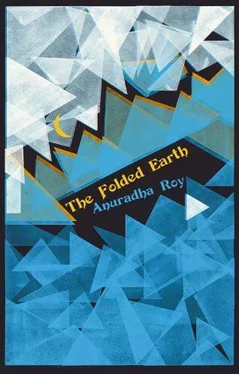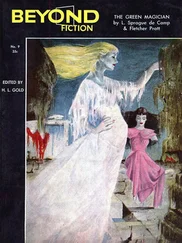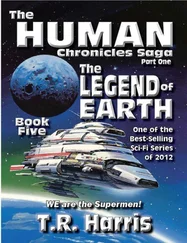This is it, you say, hearing your own voice for the first time. Where we all end. A smile of sorts cracks your face, painful in the cold air.
You get no answer. You look to your left, there is no-one. Nobody to your right, or behind, or further away, or down towards the lake. You shout a name. I try to reach it, cannot snatch a syllable of it from the wind. Your boots are heavy with blood, you can barely lift them for the weight. A drop falls, and then another, of ice-melt from the low sky. You step back from the rim of the lake and your bloodied feet, now inexplicably bare, lose their grip.
You see the water in the lake and the skeletons in it, the ice and the cloud-heavy sky in the water, rushing towards you. You feel a vast weightlessness and vertigo as you fly down through the emptiness.
You cry out, but it is not your friend’s name. You are calling, “Maya, Maya.”
Maya, illusion, a woman’s name, mine.
I woke up with my own name in my ears. Through the uncurtained windows the eastern slopes of Nanda Devi and Trishul, suspended between night and day, were icy blue. It was going to be a clear morning, with beautiful views, but I wanted to run away: push aside the forest, escape the oaks and the darkness of deodars, clear a path to the plains, run down and away from the cold, the damp, the rain and snow, the calls of owls at night. I wanted the mango trees of my childhood, the visible heat of the afternoon sun, the creamy flesh of young green coconuts and their spring-sweet water.
I flung away my mass of blankets and sprang out of bed. I wriggled under it to where I stored things I might never need: suitcases, bags, cartons of books. I dragged a suitcase out and prised at its catches. It would not open. My hair streamed over my face. The dream was still vivid, my heart thudded with the certainty of knowledge. I ran down and brought up my box of old keys which I tipped onto the floor. Rummaged through the jumble of metal and tried key after key in the rusted locks of the long-unopened suitcase. I flung aside the wrong keys not caring where they fell. I found my hammer and smashed it against the locks: once, twice, three times, until the locks broke.
I opened the creaking lid of the dusty suitcase and pulled out the heavy, plastic-covered bundle inside it: Michael’s rucksack. It had been delivered a week after his death and I had never looked through it. Today, when I opened it, there was the generations-old smell of mildew. I pulled out the sweatshirts — the blue one with the dolphin that I had bought him days before he left, a red one with John Lennon’s face; other clothes that I recognised tumbled out, crushed into tight balls in these five years of storage. And then a carefully-folded packet in which I could see a book, a Tibetan good luck charm, and a letter that I had written and sent by courier to wait for him in Dehra Dun as a surprise before he started the trek.
I opened the packet and saw that there were other papers too that Michael had placed in it for safekeeping: a few pages torn from a first-aid manual, two maps, a few typewritten, official-looking sheets from the mountaineering institute with details of the trek: the list of things the trekkers needed to carry, meeting points, train connections. On a separate sheet, there were the names and phone numbers of the trekkers. Three names, as Michael had said — he and two others — one of them an experienced mountaineer, he had told me that night before he left, the other a porter.
I closed my eyes. I was certain I knew what I would see.
The names on the typewritten sheet were:
Michael Secuira
Ranveer Singh Rathore
Shamsher Bahadur Gurung
I went back to a time when I had woken from one of my nightmares gasping for breath. Veer had calmed me with slow whispered reassurances. I had talked to him until the night paled into dawn, about Michael’s death, about everything I had gone through that year — things I had never talked about to anyone. Veer had held me close, not once interrupting me. When I finished, he had described the terrain to me with a cartographer’s accuracy. But said nothing to suggest he had been Michael’s last trekking companion. He did not mull over what might have gone wrong. He did not list the many horrific possibilities — death by frostbite, death by falling, by injury, by brain damage, by pulmonary oedema. And not suspecting what his silences hid, I had been grateful for all that he had left unsaid.
He had not told me he even knew of Michael’s mountaineering institute.
He had not told me Michael had broken his ankle.
He had not told me he had left Michael to fend for himself in a snowstorm with a broken ankle when they both knew it meant certain death.
I sat on the floor holding the papers, fragments of Michael strewn around me. The bugle at the army barracks trumpeted to wake the cadets as on every morning. Window-squares lit up one by one and smoke rose from fires for the morning’s hot water. Birds sang to each other across trees and forests. The daily business of mornings that usually made me uncurl from my quilt with a smile now hammered nails into my heart. I felt utterly, absolutely alone. Wrapping my arms around my knees, I held myself as my body shook with sobs. I wept as if Michael had died the day before. I picked up thing after thing from his rucksack and flung them across the room in a rage. How easy to be dead! Everyone had marvelled at the way I had made myself a new life in a faraway town after my husband’s death. What unnatural composure, what a swift recovery, they had said. Today it was as if I had torn off a dried-up scab with my fingernails and exposed the wound oozing for years beneath.
I had grieved for Michael’s death before. Now I would torment myself to the end of my days for my intimacy with the man who had walked away from him when he most needed help. How had I allowed it to happen? When had Veer dropped his last name and shortened his first? Even Diwan Sahib had never called him anything but Veer, and sometimes “Mr Singh”, or, when in a bad temper, “The Great Climber, Mr Singh”.
Where had the Rathore part of his name gone?
Perhaps Veer never used that last name except in formal documents. That was possible, even normal, as was the abbreviation of his first name.
Or maybe he had chosen to lose pieces of his names in the snow after abandoning Michael to his death.
I wanted to scour off my soiled skin with a rough stone. I wanted to tear out the long hair Veer had murmured endearments and promises into, playing on my sympathies with his bitter stories of childhood suffering and homelessness, the search for his identity. I had been held in thrall by the quietness of him — his enigmatic, troubling aura of unknowability. Now I knew his silence was no more than a shroud in which he had tried to bury his connection with Michael’s death.
It is December in Ranikhet. A pair of eagles wheel slowly through the sky’s ceaseless blue. They are above the Golf Course, circling the yellow-capped army caddies, the colonels and brigadiers and lesser beings ambling behind white balls, knocking them with misdirected clubs, sending them hurtling down slopes. The caddies look upward as the shadows of eagle-wings pass over their faces. They swing golf clubs in their direction and the eagles become faraway dots quicker than the eye can see.
Nearby, a dark olive convoy of army trucks is inching down the road. The line is unable to move fast for the press of people saying their last goodbyes to the young, shorn, uniformed boys packed into the trucks. There are reports of infiltrators on the remote icy border with Pakistan, and every day trucks leave with soldiers to be transported to the trouble zone. In one fortnight, everything has changed. The soldiers’ daily, morning training, their target practice, the camping in the woods in camouflage is no longer play-acting. They try not to see every familiar house, barracks, gateway, and shop as if it were for the last time. In his head, Gopal is already somewhere inside one of these trucks winding their way towards trouble. The clerk is too exhausted with anxiety to say to his son, “I told you so.”
Читать дальше












